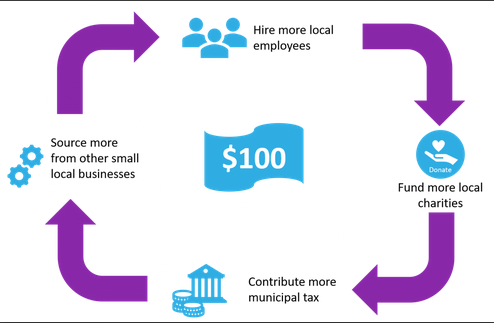There has been much in the news lately on the effects of the coronavirus outbreak on big business. This recent New York Times Live Update attributes the recent stock market plunge to the “oil market and coronavirus.” With some notable exceptions in retail making unheard of gains. “Clorox, the maker of disinfecting cleaners and wipes…shares climbed 15% so far this year”. No surprise there! But what about how the coronavirus effects small businesses?
What Exactly is The Coronavirus?

First, let’s get a handle on some of the terms.
“Coronavirus” and “Covid-19” are being used interchangeably in the press. This recent Forbes Overview provides clarity on the relationship between the two terms:
“The new virus, named SARS-Cov-2, causes the respiratory disease known as Covid-19. Covid-19 stands for “coronavirus disease 2019.”
Some Coronavirus Mythbusting
It can be hard to get an accurate read when EVERYONE ON THE INTERNET seems to be “reporting” on the coronavirus.
Yes, I get the irony 🙂
One recent viral video clip illustrates the spread of misinformation is way faster than the spread of the actual coronavirus. It suggested that the coronavirus spread exponentially faster than any other recent outbreaks (SARS, MERS, Ebola, & swine flu). Snopes helps set the record straight on that one here.
Phew! Thank-you Snopes!
The Coronavirus in Perspective
The above ABC News article helps puts this most recent coronavirus outbreak into perspectives. And yes, coronavirus outbreaks are relatively common.
The article goes on to say, “While COVID-19 seems to spread easily, the symptoms tend to be mild, particularly for people who are relatively young and healthy.” Covid-19 is simply the latest coronavirus outbreak. It can be serious, yes. But, so far, is most dangerous to immune-compromised individuals. So, in this respect, COVID-19 poses the most danger to those most at risk for seasonal flu.
However, as this Live Science article points out, “the seasonal flu vaccine prevents influenza very well.” And, as there is not yet a vaccine for this coronavirus, it makes sense to be cautious. Personally, my concern is when “cautious”, turns into paranoia fueled by misinformation. Do have a read of the Live Science article for even more coronavirus myth busting. It’s well worth it.
How Can I Reduce My Chances of Getting The Coronavirus
 Yes, the coronavirus* is spreading quickly. And it places the elderly, the very young, and otherwise immune-compromised individuals at risk. So it makes sense that we take precautions.
Yes, the coronavirus* is spreading quickly. And it places the elderly, the very young, and otherwise immune-compromised individuals at risk. So it makes sense that we take precautions.
But this is the case with all new infections. This is not humanity’s first rodeo. The best way to prevent getting sick is the same as for any other infection. Masks will not protect you unless they are properly fitted—which they usually aren’t if you buy off the shelf. Keep your hands away from your face. And proper hand washing beats hand sanitizers if you have the option. You can check out more handy tips from the CDC on how to prevent getting sick here.
And this outline from the Forbes Overview mentioned above lists the World Health Organization’s advice for staying healthy:
- “Disinfect your hands by washing them frequently with soap and water, or hand sanitizer.
- Keep a distance of 3 feet between you and anyone who is coughing and sneezing.
- Avoid touching your eyes, nose and mouth as the virus, if picked up from surfaces, can enter your body through your eyes, nose and mouth.
- If you are coughing or sneezing, do so inside a tissue, or within the crook of your elbow.”
*NOTE: *If you think you might have COVID-19, it’s important to NOT simply google “coronavirus testing near me” and take yourself off to get tested. Public Health authorities are advising to call your regional Public Health access line (811 in Nova Scotia) and they’ll let you know next steps. Similarly, if you think you have COVID-19, do NOT take yourself to emergency before FIRST calling the hospital so that they can tell you how to proceed.
How Coronavirus Effects Small Businesses: Employee and Customer Safety Precautions
There’s a great article here that goes into great detail about making your small business COVID-19-ready from Workest.
As a small business owner, you can do your bit to help prevent the spreading of the coronavirus among your staff and customers. Encourage your employees to stay home if they’re feeling any flu-like symptoms. I know many small business employees are super keen and will often go to work when feeling under the weather as they don’t want to leave anyone in the lurch. They will need to hear directly from you that you’d rather stay home and get better before coming back to work.
And, as a small business owner, stay home yourself if you’re feeling like you’re coming down with the flu or think you’ve been exposed. The current recommendations are for 14 days. You can still be available to your employees remotely by phone or video chat. This will help reduce the chances that you will spread the virus to your employees and customers.
And if your business requires your presence, you’ll need to prepare to close shop for the recommended 14 days you’ll be in self-imposed isolation. I know this sounds scary, but it’s the smartest business decision to make. Better 14 days closed than exposing your employees to COVID-19 and having all sick employees have to take 14 days intermittently as they each fall ill. That would have a much worse long-term effect on your employees and your business revenue than you taking two weeks yourself.
It’s also helpful to send around a company COVID-19 email update to employees with the best practices as discussed above as reminders to your employees to help them stay healthy. Feel free to include the CDC link I included here as a helpful reminder.
What are my Obligations as a Small Business Employer?
This article from Workest is another great resource about prepping your small biz for COVID-19—check it out for more helpful tips.
And if you’re wondering about legalities and employer obligations, this article from The Canadian Federation of Independent Businesses takes a very comprehensive look at topics including:
- “Am I obligated to put preventive measures in place?
- What are the obligations of my employees?
- Do I need a coronavirus sick policy?
- My employee is invoking their “right to refuse” unsafe work—what do I do?
- My employee just came back from a region with coronavirus. What should I do?
- My employee has a vacation time booked to a place with confirmed cases of coronavirus, can I refuse to let them go?
- My employees are taking business trips for work. Should I let them go?
- The coronavirus has been confirmed in my community, what should I do?”
How Coronavirus Effects Small Businesses: Staffing and Revenue
Small businesses will no doubt be impacted by employees who contract COVID-19. As small businesses accomplish lots with fewer employees, one person off sick will definitely affect productivity and revenue. It’s to be expected. And while bigger businesses are better able to withstand the revenue hits from employee sick leave, it’s the opposite for most small businesses.
Again, the best way to help mitigate staff sick leave is to help look after them with reminders or healthy protocols and to stay home when sick. This explains why many small business owners in the US are actively seeking out ways to help keep their employees healthy, as this Wall Street Journal report notes. After all, we can only focus on what’s within our control to best mitigate risks within our families, employees, and our small business.
Why Governments Must Help when Coronavirus Effects Small Businesses
 The Global Market has and will continue to take a hit from COVID-19, creating a bear market. So, it’s inevitable that our small indie businesses will take a hit. And, unlike the larger corporations and the banks, small businesses aren’t yet the first port of call with government funding help in a financial crisis. Though Prime Minister Trudeau recently committed $1B in funding support to address COVID-19, there doesn’t yet seem to be mention of economic support for small business owners in this plan:
The Global Market has and will continue to take a hit from COVID-19, creating a bear market. So, it’s inevitable that our small indie businesses will take a hit. And, unlike the larger corporations and the banks, small businesses aren’t yet the first port of call with government funding help in a financial crisis. Though Prime Minister Trudeau recently committed $1B in funding support to address COVID-19, there doesn’t yet seem to be mention of economic support for small business owners in this plan:
“…the federal funding aims to help provincial health-care systems cope with the increasing number of new coronavirus cases and to help Canadian workers who are forced to isolate themselves.”
https://globalnews.ca/news/6659384/coronavirus-funding-trudeau/
Federal Governments are quick to infuse funds to “correct the market” but this usually is in the form of bailouts to banks and stock market interventions. However, this focus is backwards to my mind.
Here’s why.
We know that in Canada alone, Small Businesses comprise 97.9% of employer businesses.
And in China, we know that:
In the US: “There are 30.2 million small businesses… which comprise a whopping 99.9% of all United States businesses.”
In the EU: “25.1 million small and medium-sized enterprises (SMEs) in the European Union in 2018″
Clearly, it makes sense to target financial support to Small Businesses as they contribute so much to our local and global economies!
Maybe Canada Can Lead the Way in Supporting Small Businesses During Financial Crises

With targeted financial support, governments could dramatically play in a role how the coronavirus effects small businesses. And this would benefit the global economy.
How?
Well, small businesses comprise somewhere close to 90% of many of the major global markets. It makes sense then for governments to prioritize financial assistance for SMEs during a financial crisis. Not just the banks and stock markets. It stands to reason that doing so would benefit the global economy as a whole.
What do you say, Mr. Trudeau? How about you lead the world in prioritizing targeted financial support of Small businesses during the COVID-19 pandemic? Hopefully, you’ll start a trend.
You can read more about how shopping small indie and local benefits the economy here. And if you’d prefer video, check out our explainer “The Many Benefits of Buying Small and Local” on our YouTube channel.
What Are Your Concerns about COVID-19?
Are you a business owner worried about how the Coronavirus affects small businesses? Are you feeling the effects already? What measures have you taken or do you plan to take? Share your experiences in the comments so we can all learn from each other 🙂

Makes economic sense to support small business. Well researched article, the local community thanks you.
Thanks so much, Simonne! It did take a couple of weeks to research and I’m very glad you liked it 🙂
This is great, Melanie. There are such an influx of information right now on this that I’ve had to unplug. Your article is informative and not, how do you say…freaking me out. I do enough of that on my own right now. It’s the Aries in me I didn’t know COVIDs were similar to cold viruses other than it being an upper respiratory infection (I’ve read into it’s specifics with a lot of science lingo, some of which I followed), as is SARS. Did I say great article already? I’ve been wondering how small business will be affected and those who can’t afford time off or have enough sick days to quarantine. Fingers crossed the government will use those small biz (and big) tax dollars to help us small people. We’re already in debt in Canada so what’s a little more to help people feel that they are being taken care of in crisis?
Oh that is great to hear, Tamara – thanks so much for your comment! I was in that same space before researching and providing relevant info that doesn’t freak out was exactly what I was wanting to share! I was also surprised to find that coronaviruses were so, well,common! Re small businesses, I’m no economist, but given that 97% of employer businesses in Canada are small businesses, it does make total sense to focus government support there during financial crises like these. It is possible for governments to prioritize people and still have a thriving economy. Finland is my fav example. We could SO be like Findland here in Canada! I’d happily pay higher taxes if I knew it was going back into supporting the people 🙂
This is great.